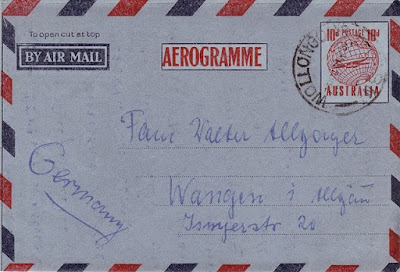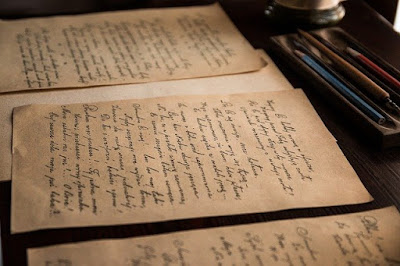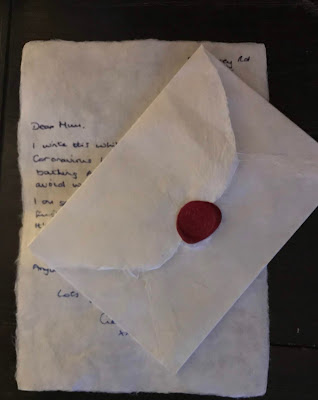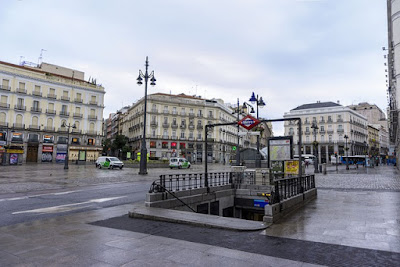How hard is it to be a writer in Gibraltar?
It's a bit of an odd question, many of you might think. How hard can it be to pick up a pen and a notebook and write out a story, or an idea, or a poem? After all, a poem might only be a dozen or so lines, not even full lines of a page at that. How hard can that be? And it can't possibly be any harder to be a recognised writer in Gibraltar than it is in any other country in the world...big(ish) fish in small pond and all that!
Oddly enough, it's not that hard in one sense and, in many other senses, it's really tough. Let me try to explain, and let's see what some of you other writers feel about it.
First of all, in terms of its physicality, writing is pretty straight forward. Most of us have been taught to write. If you grew up in Gibraltar you will probably write in English most readily, perhaps also in Spanish, and if you came from, or your parents are, from other countries, then you may write in a different language. If you're lucky and talented in equal measure, you will be able to express yourself reasonably well in written form in several languages. And, unlike golf, or scuba diving, oil painting or even baking birthday cakes, the equipment you need can be pretty minimal: pencil and paper. It doesn't have to be more than that. And then you think your thoughts, work out the words, transfer these onto the paper, preferably in a reasonably logical order and in an entertaining and clear way that perhaps other people might want to read. That's about it.
Except it isn't. Writing - real, meaningful writing - is often much harder than that. You might be able to write a paragraph in a few moments, or take a week to perfect a sentence. It depends on the subject matter, or the style you are applying or the objective of what you are writing. And writing to be published can be pretty tough. Certainly no easier than earning recognition in any other field, although you don't sit professional exams and career progression is less clear. As part of the creative industries, writing is as tough to succeed in as fine arts or film making. It's a competitive world out there that tends to undervalue creativity. So what about writing and earning in Gibraltar?
Writing for profit
Gibraltar, like most other modern cities, relies on the written word. Whether it is to communicate news, government declarations, or information about rights and responsibilities, we do so in writing. Note: that does not refer to print material only; online information relies on the written word. So the ability to write well is an important skill for our community. Furthermore, businesses in Gibraltar as across the world, rely on written material to provide information to customers, and to tempt potential customers to buy products or services. The internet has created an explosion of writing opportunities for those who develop skills in marketing, in producing 'content' for websites, adverts, scripts for marketing videos and beyond.
This means that there are many opportunities for writers and if you like playing around with words and using words to manipulate thought, then copy writing or content writing is a way for you to get your writing into the public domain and earn while you do it. This does require learning of techniques and a good deal of practice, but picking up these very specific writing skills opens up job opportunities and you can go further than this to develop a freelance writing career producing content for websites across the world. Practise, determination and producing millions of words will see you earn a reasonable income.
It might also help you to earn enough to be able to put your writing skills to use 'out-of-hours' to write that novel. Because when people talk to me about being a writer, it's being a novelist or a published poet that is what they mean. But there are many other forms of writing, content writing being one. Journalism being another.
 Gibraltar has its news outlets - broadcasters and newspapers, both online and in print. These days, many journalists will study the subject at university and then gain practical experience in a newsroom, perhaps in a regional newspaper in UK or other country. In Gibraltar, the openings for journalists are limited - we are a very small city after all - but they do exist, and good report writing along with the other skills a journalist needs to have, such as writing with utmost clarity and balance to very tight deadlines, asking the right, incisive questions to extract maximum information in a short space of time, and so on, are always desirable. Not an easy career to enter or succeed in, but a place for writers to apply their craft, once they have learned, practised and come to excel at that craft.
Gibraltar has its news outlets - broadcasters and newspapers, both online and in print. These days, many journalists will study the subject at university and then gain practical experience in a newsroom, perhaps in a regional newspaper in UK or other country. In Gibraltar, the openings for journalists are limited - we are a very small city after all - but they do exist, and good report writing along with the other skills a journalist needs to have, such as writing with utmost clarity and balance to very tight deadlines, asking the right, incisive questions to extract maximum information in a short space of time, and so on, are always desirable. Not an easy career to enter or succeed in, but a place for writers to apply their craft, once they have learned, practised and come to excel at that craft. Writing feature articles also has an outlet in Gibraltar. Again, this is limited to local publications, but a good feature writer will always be able to appeal to content-hungry editors, especially those of monthly publications that need content that will attract the public in order to circulate the adverts that form their revenue stream. In addition to this, there are features that are needed by many magazines - if you can build a good portfolio of published work then there's a good chance that you might be able to pitch to magazines across the world. Provided your subject matter is of interest and pitched to the right publication, the writing world is your oyster.
Writing feature articles also has an outlet in Gibraltar. Again, this is limited to local publications, but a good feature writer will always be able to appeal to content-hungry editors, especially those of monthly publications that need content that will attract the public in order to circulate the adverts that form their revenue stream. In addition to this, there are features that are needed by many magazines - if you can build a good portfolio of published work then there's a good chance that you might be able to pitch to magazines across the world. Provided your subject matter is of interest and pitched to the right publication, the writing world is your oyster.But don't let me leave you with the impression that any of this is easy. Publication is hard to achieve. Most magazines have a set of regular feature writers that they are happy with and the editors tend to commission work from these. It's hard to break into this field and convince an editor that your writing is worth their while. As a writer you need to find the angle, the story, and above all, the right way of expressing this in words if you are going to convince a busy editor to take you on. And even when you do, you may well find, that because writing is not considered a high-value skill (goodness knows why, it can take years of training to write one short perfect paragraph of marketing content) that you cannot command anything more than a modest reward.
But then, do we do it for the money or for the love of it? Or, I do better to ask this a different way: why should we not be paid reasonably well for our work, just because we happen to work at what we love?
In a future post, I'll write about the skills you might need to become the successful novelist, poet, or fiction author or author of a non-fiction book that many writers secretly would wish to become. Perhaps we will see that writing well is much harder than so many people realise. That means that as writers, we need to learn to appreciate the effort and skill that we put into our own work, whatever that work is. Writers are suckers for 'imposter syndrome' and yet without writers, how would we know anything about the world about us, and the worlds within us?
Become a guest writer!
If you have experience of writing as part of your work or being a published journalist or features writer in Gibraltar, please contact me and share your experiences, tips and advice with other readers by becoming a guest writer on this blog. Gibraltar Writers will benefit a great deal from your experience!




















